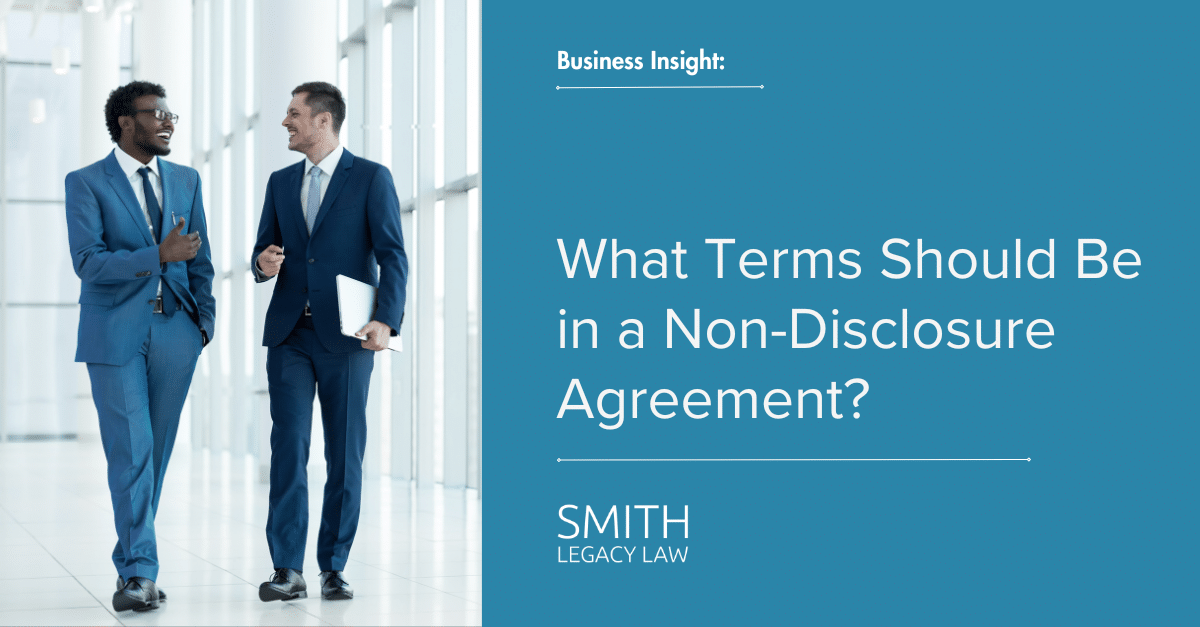If you are considering entering into a business transaction with someone where you may share sensitive company information, it is a good idea to have a non-disclosure agreement (NDA). An NDA is a contract that states that certain information provided to the other party will be kept confidential. It is commonly used in a wide array of situations, including the purchase/sale of a business, joint ventures, vendor relationships, and employment agreements. To ensure a business is adequately protected, owners should consult a business attorney about the specific terms that should be in an NDA.
When is a Non-Disclosure Agreement Needed?
NDAs serve a vital role in protecting any business’s confidential and sensitive information, including proprietary business and customer data, financial records, and trade secrets. Therefore, any time another party may be given such information, it should be safeguarded with an NDA. Without an NDA, privilege or trade secret protections may be lost.
Importantly, the NDA should be signed before any confidential documents or matters are discussed.
Should You Have a Mutual NDA?
A mutual NDA is one that applies to both sides and requires them to keep the other side’s information confidential. In a unilateral NDA, only one side is obligated to keep information private. Vendors often prefer a unilateral NDA where they are not legally bound to maintain confidentiality.
In most business arrangements, it is best to have a mutual NDA. Sometimes, a mutual NDA is contained in a single agreement. However, parties can also sign two unilateral agreements that function as a mutual NDA. If there are two agreements, it is important to confirm that the terms in both are consistent and not detrimental to one side or the other.
What Are the Key Provisions in an NDA?
A well-drafted NDA should include the following terms:
- A clear definition of “confidential.” An NDA only protects information that is deemed “confidential” under the terms of the agreement. Further, it should also include the time frame in which the confidential information must be kept confidential.
- Retention of rights. The party disclosing the information should explicitly state that it retains ownership rights of that information notwithstanding the disclosure.
- Limits on the use of confidential information. The NDA should state what the receiving party is allowed to do with the information. Typically, the receiving party must:
- Keep the information confidential
- Only use the information to achieve the purpose of the business relationship
- Limit re-disclosure to employees and/or other parties on a need-to-know basis only and ideally, require such recipients to sign an NDA with the same terms that the receiving party agreed to
- Respond to subpoenas for the information but first, give notice to the disclosing party to allow it to challenge the subpoena
- Remedies. The NDA should provide that if a party wrongfully discloses confidential information, it consents to injunctive relief. This makes it easier for the wronged party to obtain a court order to stop further disclosures. In addition, it may be beneficial to include a liquidated damages clause whereby the party that breached the NDA agrees to pay a specified amount in damages. This acts as a deterrent to violations of the agreement.
- Forum selection clause. This states that any actions must be filed in a particular court. The party providing confidential information to the other side will want a forum that is convenient in order to seek immediate injunctive relief.
- Arbitration. When requesting monetary damages, the agreement should require mandatory arbitration of disputes.
Should You Hire an Attorney to Draft or Negotiate a Non-Disclosure Agreement?
NDAs should not be treated as boilerplate contracts. A lawyer can advise regarding what information must be protected and how best to ensure the business can enforce its rights in the event of wrongful disclosure.
Our attorneys have extensive experience with NDAs and can assist with these and other business contracts. Many smaller companies opt for our Fractional General Counsel services to enable them to obtain skilled legal advice when and how they need it. Contact us today to learn more.
